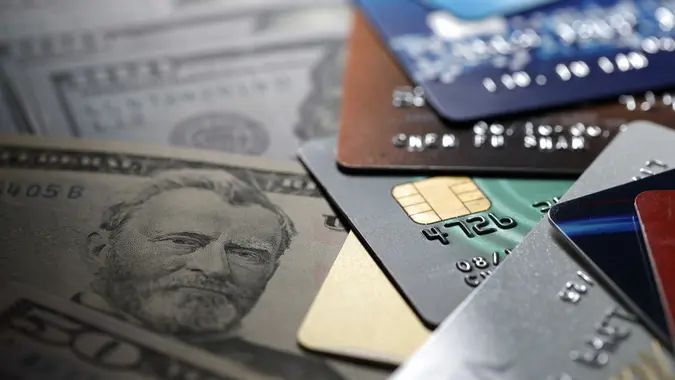Red Flags To Check for on Your Credit Card Bill Every Month

Commitment to Our Readers
GOBankingRates' editorial team is committed to bringing you unbiased reviews and information. We use data-driven methodologies to evaluate financial products and services - our reviews and ratings are not influenced by advertisers. You can read more about our editorial guidelines and our products and services review methodology.

20 Years
Helping You Live Richer

Reviewed
by Experts

Trusted by
Millions of Readers
Credit cards can be a convenient method of payment, but your card habits can impact your credit score. It’s crucial to stay vigilant about your credit card bill. Regularly reviewing your credit card statements is not just a good financial habit; it’s a necessity.
Checking your statements not only ensures you’re aware of your spending habits but also helps you spot any irregularities that might indicate potential issues. Look for the following six red flags on your credit card bill every month to safeguard your credit and finances.
1. Unauthorized Transactions
Unauthorized transactions are one of the most common red flags you may find on your card statement. Review the charges on your statement to confirm you made the purchases. If you notice charges you didn’t make, it could be a sign of fraud, a stolen credit card or identity theft.
Carefully review each transaction. If you spot anything suspicious, contact your credit card issuer immediately to notify them. Most credit card companies have protocols in place to promptly address unauthorized charges, which typically include:
- Disputing the unauthorized transaction with the merchant on your behalf
- Removing the charge from your balance until an investigation is concluded
- Freezing and closing the credit card account
- Replacing the card with a new account number
2. Inaccurate Charges
Sometimes, the names of merchants on your statement might differ from what you remember. Additionally, the amounts charged may not match your receipts. Take the time to cross-reference your credit card statement with your receipts or transaction confirmations. If you find any discrepancies, reach out to the merchant and your credit card issuer to dispute the charge and rectify the issue.
3. Double Charges
Mistakes can happen — and double charges are not uncommon. These can occur when a merchant accidentally processes a transaction twice. While some double charges may be legitimate, it’s essential to verify each one to ensure accuracy. If you find duplicate transactions, contact the merchant and your credit card issuer to request a refund.
4. Fees and Interest Rates
Keep an eye on any unexpected fees or changes in interest rates. Credit card companies may adjust fees or rates, but they are typically required to notify cardholders in advance. If you notice any unexplained changes, contact your credit card issuer for clarification. Being aware of your credit card’s terms can also help you understand the reasons behind certain fees.
5.Late or Missed Payments
Timely payments are crucial for maintaining a positive credit history. Check your statement to ensure that all payments were made on time. Late or missed payments can result in late fees and negatively impact your credit score. If you find any discrepancies, address them promptly and consider setting up automatic payments to avoid future issues.
6. Changes to Your Credit Limit
Some card companies may decide to lower (or raise) your credit limit. Changes are typically based on your credit score or history with the card issuer. If an issuer decides to drop your credit limit, it may be a clue to negative marks or a lower credit score on your credit report.
Check your report for potential identity fraud or incorrect reporting of late payments or accounts opened that you did not authorize. Card issues must notify you of the credit limit changes, but it’s important to stay on top of card limit differences on your statement balance.
The Takeaway
Your credit card statements are an important key to your financial well-being. It’s extremely important to be proactive — most credit card issuers give you a grace period of 60 days or less to dispute charges or alert the company of issues on your statements.
By being vigilant and addressing red flags promptly, you not only protect yourself from potential financial harm but also contribute to the overall health of your credit profile. Remember, your financial well-being is in your hands and a small investment of time each month can yield significant long-term benefits.
More From GOBankingRates
 Written by
Written by  Edited by
Edited by 

























